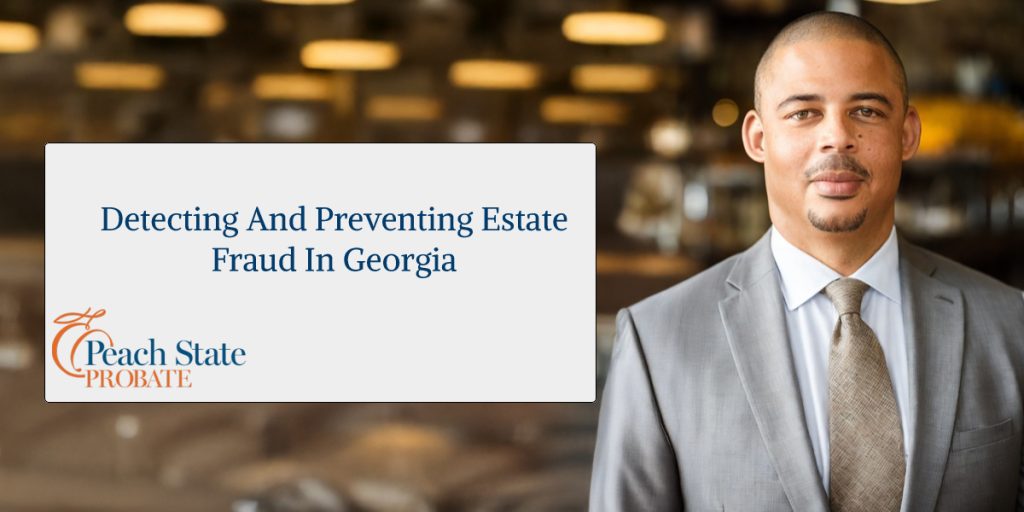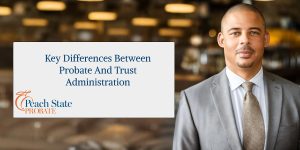## Understanding and Mitigating Estate Fraud in Georgia
Estate fraud poses a significant challenge to individuals and families dealing with the complexities of estate planning, particularly in Georgia. As a heartbreaking reality, fraudulent activities can erode the wealth and security of unsuspecting heirs and beneficiaries. Understanding the mechanics of estate fraud, alongside proactive measures, is essential for preserving one’s legacy and ensuring the fair distribution of assets. Peach State Probate is committed to guiding clients through these dark waters, providing them with insight into the legal avenues available to detect and prevent estate fraud in Georgia.
Estate fraud can take various forms, frequently involving the falsification of documents, undue influence, or manipulation of beneficiaries. Such misconduct can disrupt the integrity of the estate planning process, leaving loved ones vulnerable to exploitation. By understanding how estate fraud manifests, individuals can adopt preventative measures to safeguard their interests and assets.
The stakes are high when it comes to estate fraud; emotional grief can be compounded by financial loss, creating additional strain on families during an already difficult time. For this reason, awareness of the issue is critical. Engaging with professionals like Peach State Probate ensures that individuals receive the support and knowledge necessary to both detect and prevent potential fraud attempts effectively.
## Defining Estate Fraud: What You Need to Know
Estate fraud can encompass a range of illicit activities designed to deceive individuals regarding their rights to an estate. Common types of estate fraud include forgery of wills, misrepresentation of asset values, and undue influence exerted over vulnerable individuals. This type of fraud can lead heirs to face delayed distributions, unnecessary legal battles, and emotional distress.
Another concerning facet of estate fraud involves the exploitation of vulnerable individuals, particularly the elderly. Unscrupulous individuals may manipulate situations to gain access to power of attorney or influence the drafting of wills and trusts. Understanding the common indicators of such behaviors is essential for family members who may be concerned about the wellbeing of their loved ones. Being vigilant and educated on these tactics can help prevent fraudulent circumstances before they escalate.
Legally, estate fraud is considered a serious offense, often punishable by significant penalties, and victims may be entitled to restitution. However, the process to reclaim stolen assets can be complicated, often requiring intricate legal proceedings. Knowledge of estate fraud and its implications creates an avenue for protective measures, ensuring that assets remain safeguarded from deception.
## The Importance of Detecting and Preventing Estate Fraud
Understanding why estate fraud is a pressing issue in Georgia can significantly impact individuals and families. Frustratingly, many victims often realize they have been defrauded only after enduring considerable losses. This delay can exacerbate the emotional trauma associated with losing a loved one while navigating a complicated legal landscape fraught with deception.
Overall, estate fraud underscores the need for robust measures in estate planning. Families must take proactive steps during the estate planning process to ensure safeguards are in place, reducing the risk of fraud significantly. Additionally, it is crucial to involve experienced legal representation that can identify potential vulnerabilities in an estate plan and create solutions to mitigate those risks.
By fostering awareness around estate fraud and its implications, individuals can become proactive participants in their estate planning journey. Seeking guidance from legal professionals such as Peach State Probate can provide families with the tools and knowledge needed to navigate complexities around estate fraud effectively.
## Navigating Legal Frameworks Surrounding Estate Fraud in Georgia
The legal framework addressing estate fraud in Georgia is multifaceted, comprising various statutes designed to protect individuals during estate planning and probate proceedings. Key statutes relate to wills, trusts, and powers of attorney, ensuring transparency and regulating the execution of the estate planning process. Familiarity with these laws is essential for anyone concerned about estate fraud.
In Georgia, individuals can contest wills on several grounds, including lack of capacity, undue influence, or fraud. The burden of proof lies with the party contesting the will, signifying the importance of documentation and evidence collecting during the estate planning process. Legal professionals play a crucial role in establishing the validity of a will while addressing any signs of fraudulent behavior.
Furthermore, fraud related to estate assets can lead to criminal liability. Criminal charges may be pursued by the state, leading to restitution for victims if the fraud is prosecuted successfully. Seeking guidance from knowledgeable attorneys can be instrumental in navigating these legal waters, as they know how to effectively utilize the law in favor of their clients.
## Real-Life Impacts: Instances of Estate Fraud in Georgia
Numerous cases of estate fraud in Georgia serve as cautionary tales, highlighting the potential vulnerabilities inherent in the estate planning process. For example, instances of forged wills have been documented, where individuals have claimed assets by altering original documents. In one notable case, a caregiver manipulated the will of an elderly client to redirect assets for personal gain, demonstrating the lengths to which individuals can go in their deceit.
Another case involved family members exerting undue influence over a relative suffering from cognitive decline. When the individual created a new will favoring one sibling while disinheriting others, suspicions naturally arose. This scenario underscores the critical need for involving neutral parties in the estate planning process, ensuring that vulnerabilities are addressed through suitable legal means.
Such real-world examples emphasize the necessity of vigilance, education, and effective legal representation in the estate planning journey. Individuals can better protect their assets and loved ones by recognizing fraudulent behaviors and tendencies while working toward creating a comprehensive estate plan that prioritizes integrity.
## Proactive Measures: Steps to Prevent Estate Fraud
Taking proactive steps is essential for individuals intending to safeguard their estates from potential fraud. One strategy includes maintaining clear and transparent communication with family members regarding estate plans and intentions. This openness can deter deceitful practices, as potential fraudsters may feel dissuaded when family members collectively understand the reality of the situation.
Reviewing estate documents regularly is another pivotal measure. Regular audits can help catch any discrepancies or unauthorized alterations to wills or trusts before they result in significant complications. Engaging with a legal professional versed in estate law ensures that documents are secure, and any potential vulnerabilities are recognized and addressed promptly.
Additionally, appointing trusted individuals to act as executors or trustees can provide extra layers of protection. Having entities with proven track records of integrity and professionalism minimizes the risk of fraud, deterring those with fraudulent intentions from attempting to exploit the situation. With the right measures, individuals can find peace of mind knowing they have safeguarded their plans effectively.
## Avoiding Common Pitfalls in Estate Planning
Establishing an estate plan involves navigating numerous complexities, but many individuals inadvertently fall victim to common mistakes that may expose their plans to risks related to estate fraud. One frequent pitfall is the failure to adequately disclose or review all assets within an estate, which can lead to confusion about the beneficiaries’ rights and intentions. This misalignment can open doors for manipulation and fraudulent claims.
Another mistake arises from procrastination. Delaying the drafting and revising of estate documents can lead to ill-prepared plans, making individuals vulnerable to opportunistic fraudsters. It’s essential to stay ahead in the estate planning process, ensuring that all aspects are duly addressed in a timely manner.
Additionally, not seeking legal guidance can spell disaster in the estate planning process. Many individuals believe they can effectively navigate their own estate plans without professional assistance, but ignorance often leads to oversights that fraudsters can exploit. By working with qualified professionals from the outset, individuals can create a strong framework that minimizes the risk of fraud while ensuring that wishes are clearly articulated.
## Recognizing When to Seek Legal Counsel
Identifying when to consult a legal professional regarding estate fraud is critical for safeguarding interests. Many individuals may overlook red flags due to unawareness or reluctance to confront situations head-on. However, when suspicious alterations to wills or trust documents arise, or if beneficiaries exhibit conflicting behaviors, these should prompt individuals to seek legal guidance.
Additionally, if a family member or caregiver begins to display behaviors indicating potential manipulation, taking swift action is essential. Engaging the services of an attorney like those at Peach State Probate ensures that you receive immediate support, guiding you through the complexities of contesting a will or addressing undue influence allegations.
Legal counsel is also beneficial when initiating estate planning or executing an existing plan for the first time. This supportive measure can ensure that all aspects of the estate are thoroughly documented, as well as help individuals create safeguards to minimize risk. Seeking legal advice doesn’t just ensure peace of mind; it can also prevent future complications tied to estate fraud.
## Advantages of Legal Representation in Estate Planning
The inclusion of legal representation in estate planning decisions yields myriad benefits. Attorneys bring invaluable insights and strategies, ensuring that all legal requirements are met while identifying vulnerabilities. Their experience in detecting red flags allows them to proactively resolve potential issues before they mature into fraud.
Additionally, legal professionals can provide clarity in drafting documents, promoting transparency and thoroughness throughout the estate planning process. Expert advice can ensure that all documentation is executed according to legal standards, significantly reducing discrepancies or challenges later.
Ultimately, having representation ensures comprehensive support during the probate process or when contesting an estate plan. Legal professionals can advocate on behalf of individuals, advancing their case with an understanding of the nuances within estate law. Families benefit from this kind of guidance, receiving consistent support as they navigate emotionally challenging waters.
## How Peach State Probate Assists in Combatting Estate Fraud
Peach State Probate is dedicated to combating estate fraud through comprehensive services that empower individuals and families. Attorneys at Peach State Probate focus on proactive strategies that address emerging threats associated with estate planning, giving clients the confidence they need to protect their assets.
By utilizing a client-centered approach, the firm ensures that estate plans are meticulously crafted with safety measures explicitly designed to detect and prevent fraud. This careful attention to detail is combined with a commitment to fostering clear communication, allowing families to express their wishes and concerns openly during the planning process.
Furthermore, Peach State Probate provides ongoing education regarding estate fraud and potential warning signs. Clients receive resources that equip them with the knowledge necessary to recognize potential fraudulent attempts. Through diligent advocacy and targeted prevention efforts, Peach State Probate stands as a vital ally in safeguarding assets and ensuring compliant estate practices throughout Georgia.




